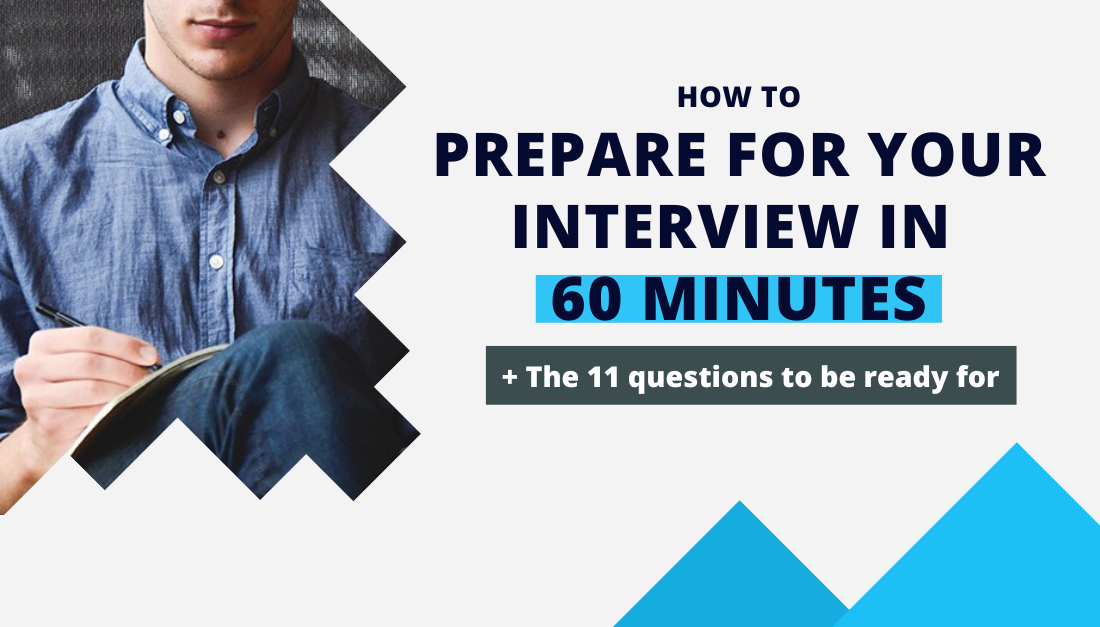
How to Prepare for your Job Interview in 60 Minutes or Less
The average job posting attracts 250 applications. The average company will then bring in 6–8 people in for a job interview and only one person will get the job.
There are very few moments where a 30 minute conversation with a total stranger can change the course of your life.
What’s more scary is that 99% of us don’t properly prepare for this unique moment.
I know I certainly didn’t.
When I was on my 14-month long job search, I made all the mistakes you could possibly imagine, including preparing for my interview the wrong way.
In this post I’ll share how to perfectly prepare for your job interview in 60 minutes or less. I’ll show you:
1. The #1 mistake people make when preparing for a job interview
2. A system to prepare that will guarantee you 10x better results
3. How to customize this system to your own unique needs
Let’s dive right in. First let's address why...
Researching doesn’t prepare you for your interview
During my career pivot back in 2015, it took me 4 months to land my first interview.
I was SO excited to finally get to prove my worth.
As soon as I got the confirmation email, I opened up my computer and spent 5 hours researching the company.
I studied their website, read their blog posts, and even signed up for their email list.
The next day I paced nervously in my room as I waited for the call. The phone rang and after a quick 30 minute conversation we were done.
“I think that went alright,” I thought to myself.
👉 The truth was even I knew I was lying to myself.
I had blown it…
But that’s okay, there will be other opportunities, right?
I spent 3 more months applying to jobs and landed a few more interviews, but the same pattern happened.
What I didn’t know at the time is that I was making the same mistake that 99% of other people were making.
I thought that to prepare for a job interview meant I had to know who the company was and a little bit of the background of the person I was talking to.
👉 If this is your way of preparing for job interviews, I can tell you now that it’s probably doing very little to actually help you.
At best, you might be improving your chances by 10–20%, but you’re not significantly improving your interview skills.
This is because what companies put out on their websites and in PR articles is almost never what’s actually going on in the company itself.
In many cases, doing exhaustive research on a company can actually mislead you more than it can help you.
Should you research a company? Sure, but don’t spend more than 15 minutes on it.
Instead, the best way to prepare for a job interview is to actually practice answering the questions you’ll be asked during the interview.

Prepare for your interview with real interview practice
Most job interviews you’ll go on will ask you the same sets of questions. These can be divided into 3 categories:
- General questions
- Behavioral questions
- Gotcha questions
In a little bit I’ll show you how to practice your answers to these questions using a clever system I’ve developed, but first let’s break down how each of these questions differ:
General interview questions
The first type of interview question you’ll be asked are general questions about your background and your experience.
Some typical questions in this category include:
“Tell me about yourself.”
“Tell me about your previous role.”
“What made you interested in this particular role?”
“What made you interested in our company?”
☝️ (Notice that doing company research would only help you with answering the last question.)
These questions are relatively easy to answer, but there is one big mistake that people make even when answering these simple questions…
Most job seekers spend way too much time answering these questions, which doesn’t leave them with enough time to get to the more important questions later on.
Here is a short video from our free interview course that explains how to answer the “Tell me about yourself” question quickly and succinctly:
Behavioral interview questions
The second type of interview question you’ll need to prepare for are behavioral questions.
As I cover in our free interview course, a job interview is just as much about how easy you are to get along with as it is about your qualifications.
Like the name suggests, behavioral questions are trying to figure out how you behave under different situations.
Some behavioral questions you‘ll encounter are:
“Can you tell me about a time you made a mistake or things went wrong?”
“Can you tell me about a time you had to do something outside your normal job description?”
“Can you tell me about a time you learned something and how did you apply that going forward?”
Anytime you hear an interview question that starts with “tell me about a time that…” you’re being given a behavioral question.
Gotcha Interview Questions
Lastly we have the worst type of interview question you’ll encounter, known as the “gotcha” questions.
Gotcha questions include:
“Where do you see yourself in 5 years?”
“Why did you leave your previous company?”
And everyone’s favorite…
“What’s your greatest weakness?”
These questions are meant to trick you to reveal any red flags that you may be holding back.
I wrote an entire post just about how to answer trick interview questions so you can read that to learn how to answer those questions specifically.
Now, let’s talk about how to prepare to answer any of the interview questions above.
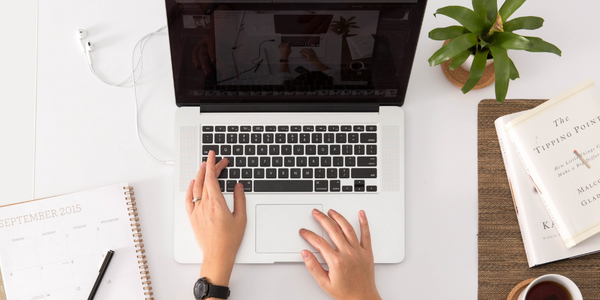
Prepare for your interview with timed practice
After my first few struggles with interviews, I realized that my ad hoc interview prep wasn’t cutting it.
I knew if I had any hope of passing my interviews, I would need to systematize my approach.
So that’s exactly what I did.
Over 8 months of trial and error, I developed a system of preparing for interviews which I’ll share with you here.
Like I mentioned before, the single most common mistake people make during a job interview is that they spend too much time answering each interview question.
The typical job interview lasts 30 minutes.
That means that if you spend 10 minutes answering a question, you can only answer 2–3 questions max.
This means that you’ll be evaluated entirely on a super small piece of your experience.
Not good.
To overcome my tendency to ramble during my answers, I started setting a timer on my phone and created the following system to practice my interview answers.
Here’s what to do:
- Choose an interview question from the ones above or you choose one from the following lists:
a) This great list of common interview questions assembled by Shelley Piedmont
b) This list of 31 more interview questions - Read the question out loud and then click “start” on your phone timer (most phones have this feature under the alarm section or you can use my online interview timer tool here).
- Try to answer the question in 3 minutes or less (pretty much all interview questions can be answered in under 3 minutes.)
- Repeat this process 3 times in a row for this question before moving on to the next question.
Your first answer to the question will usually be pretty bad. You might even stumble or completely freeze up.
That’s totally okay!
Remember, this is practice.
This is also the reason why it’s so important to repeat answering each question 3 times in a row before moving on to the next question.
👉 The goal here isn’t to memorize your answer.
On the contrary, you want your answer to evolve with each repetition, getting slightly better and better until it’s in a good place.
Once you’ve repeated the answer 3 times and feel good about what you said, move on to the next question and repeat steps 1–4.
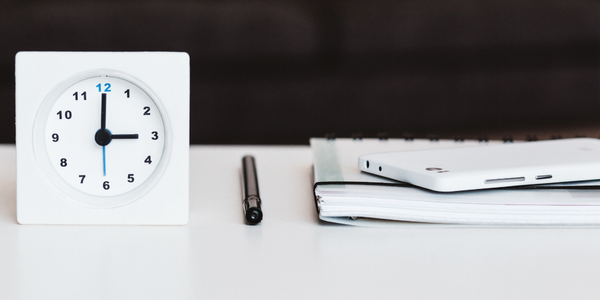
Create your interview practice schedule
Once you start using this system, you’ll want to create a practice schedule so that you can work on each set of questions.
When I used this system, I like to do:
30 minute practice session
3 repetitions per question
3 questions per session
This meant that I could hone my answer to 3 questions during my 30 minute session.
Which meant that in 60 minutes I could build confidence in answering at least 6 interview questions, more than enough for the typical 30 minute interview I was going to encounter.
I recommend you create your own interview practice schedule. You might find that you can go longer than 30 minutes or maybe you get burned out early and just do 20 minutes.
Regardless of what you choose, creating a schedule for your interview practice will take you miles farther than just staring at a computer researching a company.
A word of caution: It’s also important not to over-prepare for an interview or you may burn yourself out. You don’t want to start sounding rehearsed, so I recommend spending only 60–90 minutes practicing before going for your interview. It’s just enough time to get good, without getting robotic.
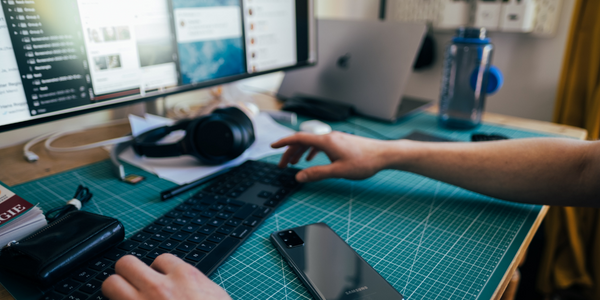
Create your pre-interview ritual
The last step to prepare for your interview is to figure out what you’ll do right before the interview.
Just like an athlete getting ready for game, it’s good to have a ritual that will get you in a good state of mind before the big moment.
This will usually be very personal to what helps you, but I’ll add a few things I found helpful to me here:
1. Decrease the caffeine
There’s nothing like an interview to get your adrenaline pumping. Add caffeine to that equation and it usually makes things too intense (or at least it did for me). On the day of my interview, I usually drank 1/3 the amount of coffee I usually do and it helped out a lot.
2. Get the nerves out with activity
I noticed that I would get the most nervous right before my interview would start. This led to me forgetting all my training and reverting back to my old habits of nervousness and rambling.
To remedy this, I found that doing some quick physical activity helped shake the nerves. To accomplish this, 10 minutes before the interview would start I would do 50 jumping jacks. Then I would walk around while my heart rate came back down.
This worked incredibly well and let me go into the interview with a nice calm state of mind.
3. Pump up or cool down with music
3 minutes prior to my interview, I found it helpful to play some of my favorite music. In my case, this was some Jack Johnson classics that would instantly put me in a happier state of mind.
Depending on your personal taste, you may want to play something more or less intense, but playing a favorite song can help bring you into that great state of mind before you answer the phone for your interview.
You’re ready for your interview!
And that’s it! If you follow this basic protocol to prepare for your next job interview, I guarantee you’ll do better than if you’re just doing research.
If you want to improve even further, I recommend checking out our free interview course. It has video tutorials that explain the 4 types of interviews you’ll encounter and how to modify your approach for each one.
Here is an example of how to prepare for the manager interview from the course:
You can also access our free interview toolkit here which has an interview timer and some helpful guidance on how to prepare further.
Lastly, if you have any questions, feel free to join our members-only chat group where you can ask me any questions about your interview prep, resume, LinkedIn profile, and more.
---
Read more resume, LinkedIn, and interview best practices on The GHYC Blog.
Get 1-on-1 Help
Need to land your job ASAP? Fast forward your job search with some 1-on-1 help! 👇
More from the blog:
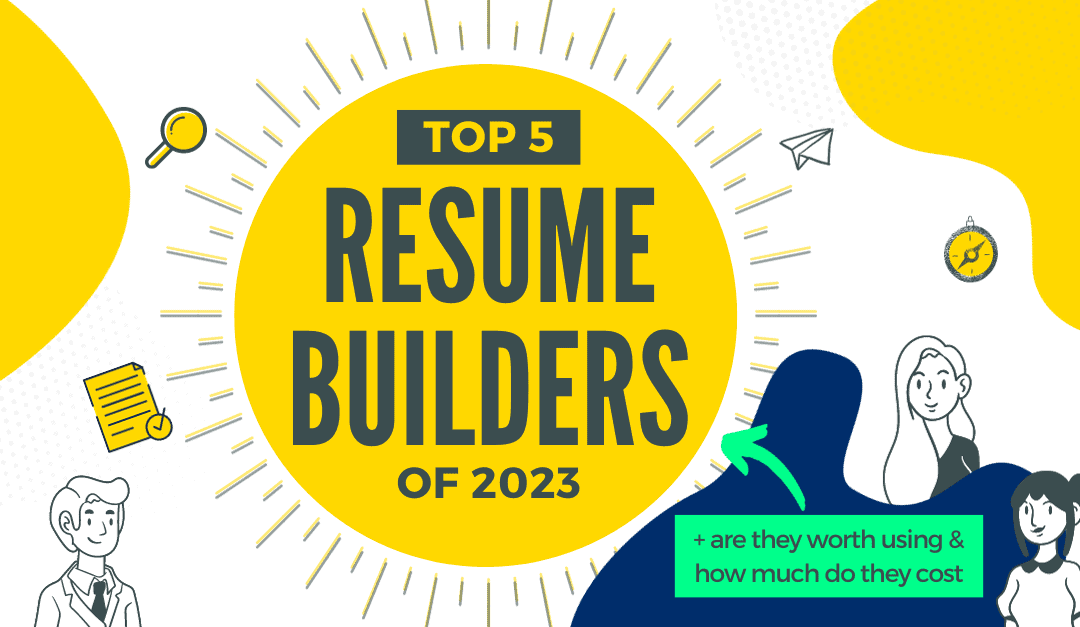
Best Resume Builders of 2023 (Pros & Cons + Prices)
Modern resume builders use AI, ATS-friendly templates, and active recommendations to help you build your perfect resume faster than ever before. In this post we’ve rounded up the 5 best resume builders of 2023.
How to Beat the ATS in 25 Minutes | The Ultimate Guide
In this guide I’ll show you how to beat the ats (applicant tracking system), plus I’ll give you 2 ATS-friendly resume templates and a free tool to test if your resume is ATS-friendly.
Like this? Try our free courses!
Tired of sending your job applications into a black hole and never hearing back? Get hired faster with our guided courses all for FREE!
Bogdan Zlatkov is the Founder of GHYC and author of "The Ultimate Guide to Job Hunting", ranked #1 on Google. He has been featured in the Wall Street Journal, Fast Company, HR Dive, and more. At GHYC, Bogdan creates job search courses & tools by working with award-winning career coaches, best-selling authors, and Forbes-Council members. Prior to GHYC, Bogdan led the content programs at LinkedIn Learning.
